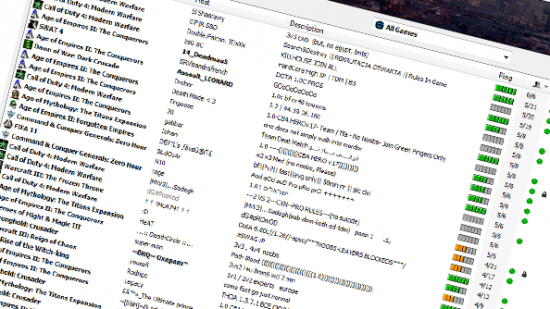GameSpy’s been keeping our games’ multiplayer alive since 1996 but on 31 May it’s shutting down for good. With it goes the server support for a great many games, making them unplayable online. Or, that would be the case if it weren’t for Scott Kevill, creator of GameRanger.
His software is filling the void left by GameSpy but it does more than just let you play Grid online or boot up a match for Star Wars BattleFront 2. It can actually make the games better.
Kevill had to delay our interview because a player had found a bug in Battlefront 2. “The game is crashing for a lot of people if they don’t have a mic connected,” he tells me. Currently the fix is to simply plug a mic in. “I don’t think the game itself even uses it, which is more weird.”
Apparently it because “some library [LucasArts] are using was never tested in a situation without audio input. Modern sound cards and integrated audio try to be smarter by disabling the device if there’s nothing physically in the socket. Older hardware wasn’t that clever, so it would always show an enabled audio input device even if it would be completely silent due to nothing connected.”
Normally there wouldn’t be a hope of Battlefront 2 being fixed, the game was released almost a decade ago and, since then, LucasArts has shut down. But Battlefront 2 is one of the lucky ones, Kevill’s added it to GameRanger, which “can dig into the internals of the game if needed.”
When he adds games to his service he fixes their bugs and improves upon their original performance.
It all started for Kevill back in the 90s on the Mac. “Games were usually developed on the PC,and a separate company ported them to the Mac,” he told me. “Typically that meant that the Mac version had no access to the online gaming services at the time (such as MPlayer, HEAT.net, and MSN Zone), and as such they had no way for players to find each other.
“I had already written a couple of server browser apps for some of the Quake and Unreal games when I realised there was a gaping hole that needed to be filled.
“I built GameRanger as a general online gaming service to work with many games, and it gradually became the de facto standard service for the Mac.
“Fast forward many years, and I added support for the PC and even cross-platform play for some of the games. Since then I’ve been adding support for more and more games, and the growth has really taken off.”
The software he first developed was “adding support for games without needing them to be updated.” That tech’s still at the core of the software, it “makes it so nearly every game has first-class support that works as smoothly as if the company had integrated an SDK.” He had to build it this way because “early on I realised there’d be a Catch-22/Chicken-Egg situation. Companies would want to see users to be interested, and users would want to see games to be interested.”
What it means in practice is that “one click from GameRanger and you and your friends are in the game, no matter which game.”
If you want to play Grid, for instance, a game whose servers Codemasters shutdown, you don’t need to fiddle around with any settings, you just join one on the GameRanger server list and it boots the game up and joins the match.
Despite being around for years you may not have heard of GameRanger. That’s set to change with the closure of GameSpy. Kevill’s client will become the easiest way to get these old games working. He’s already seen “a little bump” in the number of people using GameRanger but he suspects “the real boost will happen when the closure actually hits.”
“The important thing is for everyone to know where to go when it does happen so the communities don’t fragment and scatter. Just like crowds attract crowds, the opposite effect can happen, too.”
It doesn’t help that “There’s been a lot of misinformation spread around, which has led to more “the sky is falling!” hysteria than needed. eg. Reports of DOS games being affected […] the key point is that every one of these games can continue on, given enough time.
“(And dedication.)”
A couple of hours after our interview I got a message from Scott:
Our games are in safe hands.
